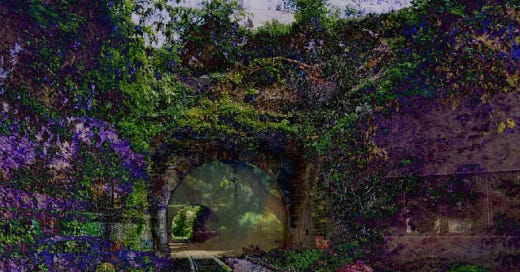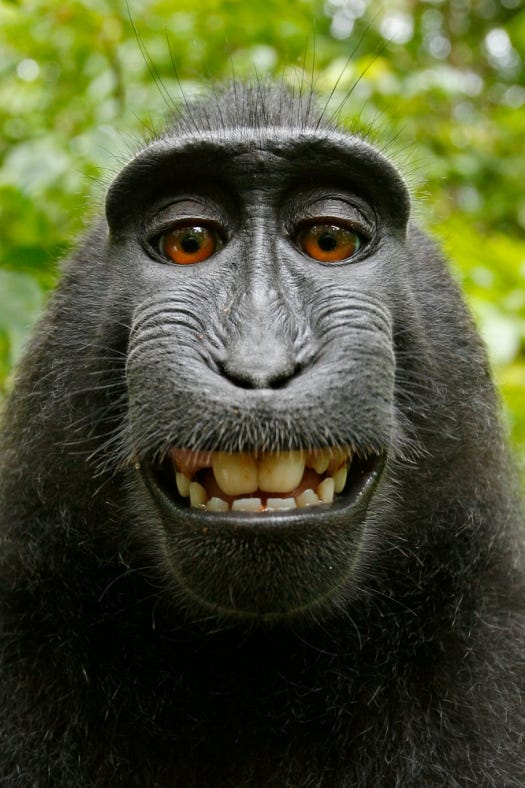Are AI works now copyright free?
Reading a new judgment shows that is not the case
The art below is called “A Recent Entrance to Paradise” and can be shown here because it is not copy-protected. Why? A court ruled that it could not be covered as it was generated by an AI without human authorship — a requirement for such protection.
This led to lots of speculation about what all this means. Cory Doctorow was giddy with excitement (sort of) claiming that everything created by AI could be copyright free.
Monkey See, Monkey Do
But let’s look at the actual judgment. The basic logic is consistent with precedent, the most famous of which was this picture.
This was a selfie taken by a monkey for which the camera’s owner wanted copyright because he had set up the camera and then let nature take its course. It was a fun case, and I wrote about it back in 2014. And because I enjoyed reading my own conclusion so much, I have decided to foist it on you here: (Note: Slater was the “photographer.”)
At this stage, Slater’s hope rests on his word against the monkey and whether they engaged in a collaboration. But I want here to suggest that this issue does not represent the ruination of copyright.
Here is the thing: these pictures have most of their value precisely because they were taken by the monkey. The composition and the expression are all because of that. It could not have arisen any other way. Nor would it have had much additional value if it had not been taken by a monkey. Let us all be clear about this: it is the fact that the monkey worked out how to use the camera and take the picture that led to most, if not all, of the picture’s value. And if Slater couldn’t compete, it is surely his own artistic fault.
What is more, there were alternative paths to appropriability open to Slater. For instance, he had hundreds of monkey images. All in great quality. He could have released them as a book. What a great gift for a coffee table. Yes, you might argue, he was exploiting the monkey but, as we all know, the monkey didn’t have the copyright and by gollie, there isn’t room in this market for two or more monkey selfie books. I think he could have done well.
Second, what if some animal does shoot the perfect shot while you are out alone in the jungle? Unless you have an overly moral sense, one suspects that so long as you are willing to not tell the whole frigging world who took the picture, the secret is safe and you could pretty much assert copyright without there being much in the way of a legal contest; well, unless the monkey in question is Caesar.
So just as the monkey was not human, the Court held neither was an AI and so the copyright claim asserting an AI author was dismissed.
Is that it for AI copyright?
Now you might be thinking, “hang on a minute, I know what the monkey was up to, but how exactly did this AI software create that image?” And that is a good question. The owner of the software claimed that the software was the only author. Then he tried to register the copyright as a non-author on the basis that the AI was performing “work for hire” by him. Now I am not sure the AI was compensated any more than our happy monkey was, but let’s imagine, in some faux-slavery sense, there was some labour contracting going on. The court basically said, “if you say no human is an author, then this creation is not copy-protected.”
Of course, that leads me to my concluded paragraph regarding the monkey. Why was authorship not claimed? In a pertinent footnote in the judgment, the judge seems on to this.
See, we all know now that you don’t produce some image with AI without telling it what to produce, even if it is just an instruction to throw something together at random. In other words, there is always a prompt. In other words, that monkey did much more to take that picture than the AI did in generating that image. Everyone seems to know it, yet no one contested the whole “I didn’t touch it” claim, and so it was an uncontested fact.
Thus, we do not have a situation where AI output is not copy-protected — at least not based on current AI technology. Instead, we have a situation where if you insist your teapot wrote a book, then you aren’t going to be able to just claim copy-protection over it. The simple advice is: if you want copyright protection, don’t claim that!
However, one day, we may actually get a machine that can perform like an animal and fully author a creative work. This judgment says, and I think this is what copyright law also says, that such creations will not be copy-protected. Well, it is just as well those future AIs won’t be able to starve!






